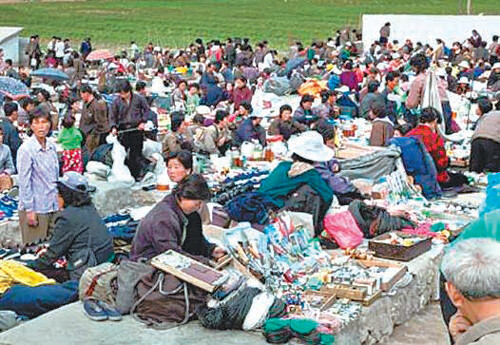hankyoreh
Links to other country sites 다른 나라 사이트 링크
North Korea holds first finance industry conference in 25 years

North Korea hosted the first national conference of employees at financial institutions in 25 years. The last time such a conference was held was Sep. 1990, while Kim Il-sung was in power.
Some analysts think this can be regarded as an effort to improve the financial system in the North to enable the unobstructed circulation of funds, given that the economy is recovering to some extent. This recovery has been achieved thanks to “unique North Korean methods of managing the economy” implemented under the Kim Jong-un regime, namely an increase of autonomy and incentives at factories that were included in the so-called May 30 Measures.
Measures for improving the financial system may be announced at the 7th Congress of the Korean Workers‘ Party, which will be held for the first time in 36 years early in May 2016.
On Dec. 14, the Korean Central News Agency (KCNA) and other state-run North Korean media reported that the 3rd National Conference of Workers at Financial Institutions took place at the People’s Palace of Culture in Pyongyang on Dec. 13.
“Participants in the congress analyzed the experience of the finance industry and the results it has achieved in the past and discussed the methods required and tasks remaining to underwrite the great task of building a strong nation,” North Korean media said.
Participants at the conference included Premier Pak Pong-ju; Pak Yong-sik, Minister of the People’s Armed Forces; Korean Workers’ Party (KWP) Secretary O Su-yong; Vice Premier Ro Tu-chol; Vice Premier Ri Mu-yong; Vice Premier Ri Chol-man; Finance Minister Ki Kwang-ho; Kim Chon-gyun, President of North Korea‘s Central Bank; and Kim Song-ui, President of North Korea’s Foreign Trade Bank.
In a letter sent to conference participants, North Korean leader Kim Jong-un urged for the mobilization of funds through currency circulation.
“It is only by improving and strengthening the financial sector that we can independently satisfy the demand for funds. We must stimulate the finance sector and make effective use of the financial foundation that is already prepared so that we can apply more funds,” Kim said.
“Compared to 1990, the national budget revenue has increased three-fold,” said Ro in the conference report. In addition to being Vice Premier, Ro is also chair of North Korea’s State Planning Commission.
Experts believe that North Korea is taking steps to improve its financial system. This can be seen as an effort to support the circulation of currency, which has been increasing because of the recent expansion of “jangmadang,” or unofficial markets, and of businesses in the areas of construction, distribution, and service backed on investments from private lenders.
There is also a growing need to effectively circulate the foreign currency that is being earned by the estimated 150,000 or 200,000 North Koreans who are sent overseas to work and to ensure that this currency is incorporated into the financial system. It is also possible that cash transactions between corporations - which have been restricted because of inflation - may be allowed once more since the price of goods has remained stable since 2013.
“We are concentrating our efforts on satisfying the need for funding that arises in building an economy through the method of fluid circulation of domestic funds. As part of that, we are looking to develop new financial products and allow the people to use credit cards in their everyday lives,” Central Bank President Kim Chon-gyun said in an interview with the Chosun Sinbo, the newspaper of the General Association of Korean Residents in Japan (Chongryon), in February.
By Kim Jin-cheol, staff reporter
Please direct questions or comments to [english@hani.co.kr]

Editorial・opinion
![[Column] Season 2 of special prosecutor probe may be coming to Korea soon [Column] Season 2 of special prosecutor probe may be coming to Korea soon](https://flexible.img.hani.co.kr/flexible/normal/500/300/imgdb/original/2024/0426/3317141030699447.jpg) [Column] Season 2 of special prosecutor probe may be coming to Korea soon
[Column] Season 2 of special prosecutor probe may be coming to Korea soon![[Column] Park Geun-hye déjà vu in Yoon Suk-yeol [Column] Park Geun-hye déjà vu in Yoon Suk-yeol](https://flexible.img.hani.co.kr/flexible/normal/500/300/imgdb/original/2024/0424/651713945113788.jpg) [Column] Park Geun-hye déjà vu in Yoon Suk-yeol
[Column] Park Geun-hye déjà vu in Yoon Suk-yeol- [Editorial] New weight of N. Korea’s nuclear threats makes dialogue all the more urgent
- [Guest essay] The real reason Korea’s new right wants to dub Rhee a founding father
- [Column] ‘Choson’: Is it time we start referring to N. Korea in its own terms?
- [Editorial] Japan’s rewriting of history with Korea has gone too far
- [Column] The president’s questionable capacity for dialogue
- [Column] Are chaebol firms just pizza pies for families to divvy up as they please?
- [Column] Has Korea, too, crossed the Rubicon on China?
- [Correspondent’s column] In Japan’s alliance with US, echoes of its past alliances with UK
Most viewed articles
- 1No good, very bad game for Korea puts it out of Olympics for first time since 1988
- 2[Column] Season 2 of special prosecutor probe may be coming to Korea soon
- 3Korea’s 1.3% growth in Q1 signals ‘textbook’ return to growth, says government
- 4‘We must say no’: Seoul defense chief on Korean, USFK involvement in hypothetical Taiwan crisis
- 5Is N. Korea threatening to test nukes in response to possible new US-led sanctions body?
- 6Division commander ordered troops to enter raging flood waters before Marine died, survivor says
- 7[Column] ‘Choson’: Is it time we start referring to N. Korea in its own terms?
- 8Will NewJeans end up collateral damage in internal feud at K-pop juggernaut Hybe?
- 9Korea sees more deaths than births for 52nd consecutive month in February
- 10[Editorial] Korea’s surprise Q1 growth requires objective assessment, not blind fanfare